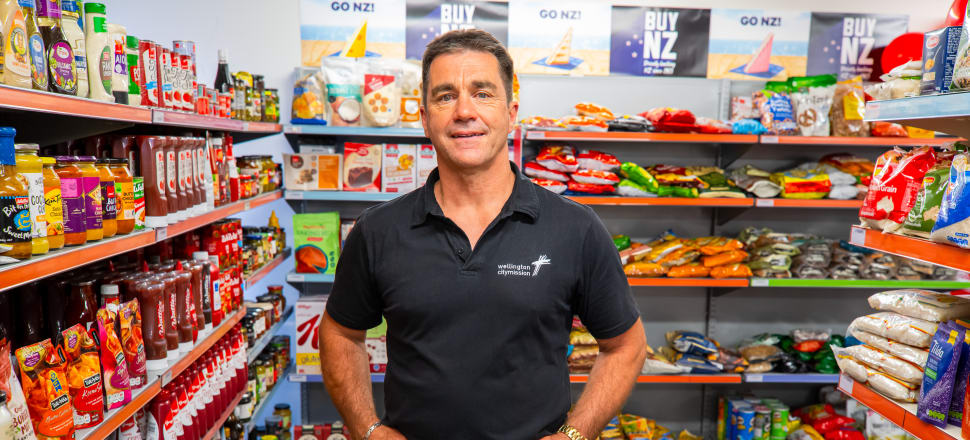
Wellington’s City Missioner is urging people to “pay attention” in 2023, with individuals and households expected to face their toughest year yet
“It is getting worse and what’s also getting worse is people’s ability to cope.”
Murray Edridge said many people were on the cusp of needing additional support financially, and after a couple of testing years, mentally as well. READ MORE *Robertson to go back to ‘basics’ for next Budget *Three months in: inside City Mission’s new home
“And it only takes something small, they blow a tyre in the car - if they have a car - or one of the kids gets sick and needs some medication or support.
“Then all of a sudden that one thing starts to create this cascade of chaos, because people are just getting by.”
Last year was tough. Inflation is at 7.2 percent and this year won’t feel much better with Treasury forecasts for CPI at 6.4 pct.
Its half-year update also predicts an upcoming shallow recession, with unemployment levels trending upward until mid-2024 to 5.5 percent.
And while it is more optimistic than the Reserve Bank on inflation’s tipping point, it's not seeing levels return to the target range until the end of 2024.
"I think next year is going to be the hardest year we've seen for a very long time, probably in most people's living memory," Edridge concludes.
Among a raft of supports, the City Mission operates transitional housing facilities, financial mentoring, and a social supermarket.
Helping those in need and engaging with vulnerable communities is clearly bread and butter work.
But Edridge said engaging and working with the communities who don’t - and won’t - need extra help, was also important.
“A significant part of my job is to talk to the group that are not struggling quite so much. Because let's face it, for most of us the cost of living crisis is an inconvenience or a frustration.
“So for people in that place who are thinking: what about the people who don't have what I have? Don't look like I look? What about them? Do I need to pay attention to that? My answer is yes, you do.”
He said it was vital to keep the connections alive - a step to stop a wealth and societal divide from growing.
“You see this in jurisdictions overseas and if you get this major disconnection between wealth and societal position then all of a sudden you're terrified of the people that live outside your very high wall."
He understood that concept might be difficult for some.
“Because people live individual lives and don't necessarily want to be seen as the people that are sticking their noses in and getting involved when it's not wanted.
“My encouragement to people is to pay attention to what's happening around you, notice things happening, notice people. We often hear reflections about groups in our community, like gang members or whatever, and actually, they're just individuals and I'm not suggesting people put themselves at risk or anything, but just pay attention... you never know where that leads.”
"Cut people some slack and treat people with dignity, irrespective of their circumstances.” - Murray Edridge
However, his plea to the Government is stronger.
“I hope our political parties will pay attention to the needs of those who are at the bottom. And that's not necessarily about vote catching - it's about doing the right thing.
“Those two don't always go hand in hand so whether that's a politically saleable proposition I don't know. I suspect not.”
Edridge admits he’s anxious about the rhetoric that will ramp up towards the election.
“I'm pretty anxious about some of the responses to youth crime that we’re seeing and often it's people making these policy decisions, or all these manifestos who haven't really understood the real life circumstances of the people that are impacted by it.
“Because when you get to walk for a while in someone else's shoes or walk alongside them, it gives you a different perspective. You can have as many policy makers as you like, but if you don't understand what people's lives look like then the real risk is you do more damage.
“So I think we're going to see a somewhat chaotic year politically as well.”
He does expect to see some short-term relief support for people, perhaps similar to the cost-of-living payment out of 2022’s Budget.
“It's interesting because all the political conversations get very exercised about people who get it who don't need it or don't deserve it. Well, yeah, that probably happens. But actually, maybe that's just the cost of ensuring that those who do need it actually get it as well.
“So I've become far more forgiving on government policy that perhaps isn't as targeted as it might be, as long as it helps those who are particularly in need.
“I suspect there has to be both some here and now support for people, but hopefully some longer term plans next year from our politicians about dealing with the challenges that we're facing as a community."
Edridge said 2023 needed to be the year people were cut some slack.
“For the vast majority of the people we work with, they're not solely or even at all responsible for their own circumstances. Things have happened to them... and so that doesn't seem fair.
“For many people [2023 is] going to be probably the toughest year they've ever faced. So just be mindful of that and cut people some slack and treat people with dignity, irrespective of their circumstances.
“Maybe [2023] will be the year we fully grow up as a country and really start to care for those who need it."







